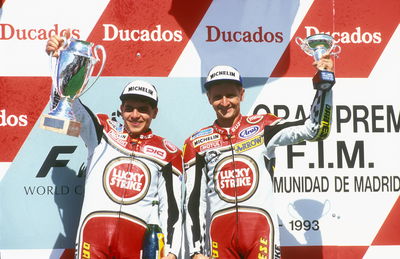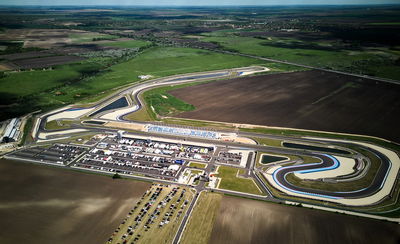KTM: Lockdown for bodies, not for brains…
It might be an exaggeration to say that the recent lockdown will result in a surge of MotoGP innovation.
But KTM Motorsport Director Pit Beirer is sure the time spent by his engineers at home was far from wasted.
In other words, you can lockdown the bodies, but not the brains.
'You have engineers sitting at home, thinking, brainstorming and putting things together in their mind," Beirer told Crash.net.
'New parts grow in the head of very special engineers and if they have extra time to think, that's 100 per cent quality time to develop a motorcycle.
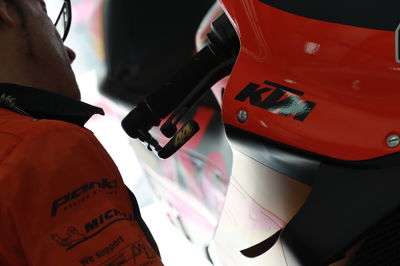
It might be an exaggeration to say that the recent lockdown will result in a surge of MotoGP innovation.
But KTM Motorsport Director Pit Beirer is sure the time spent by his engineers at home was far from wasted.
In other words, you can lockdown the bodies, but not the brains.
'You have engineers sitting at home, thinking, brainstorming and putting things together in their mind," Beirer told Crash.net.
'New parts grow in the head of very special engineers and if they have extra time to think, that's 100 per cent quality time to develop a motorcycle.
"These ideas will not produce an immediate result at the end of the crisis, but for sure our new developments could be based on this thinking.
"Usually you need to rush to from a race, to a test, to a race… There are many other things going on around you," Beirer added.
"That's why such a [lockdown] is not just negative because now there has been more time for brainstorming and thinking.
"You can work on electronics, you can work on designs and you can still develop a new motorcycle from an engineering point of view. So for sure the time was used very well."
Austria imposed an early lockdown compared with most of Europe, starting on March 16.
The tactic seemed to pay dividends in containing the coronavirus and the country was able to lift its lockdown on May 1, followed by further incremental steps towards normality.
Working for 2022
Beirer also sees a similar bright side to the recent MotoGP technical freeze, which will prevent any aerodynamic or engines changes being introduced until the 2021 season is underway.
The normal cycle of technical developments will not return until 2022.
"To develop a MotoGP motorcycle, you also need a lot of time," said Beirer, speaking before KTM became the first MotoGP team back on track courtesy of this week's private test at the Red Bull Ring.
"The technical freeze means some new parts might not need to be ready for 'next week'. So if we can start testing again and use that knowledge to build new parts, test those parts, go home and improve them again - that achieves something and is a gift for our engineers," he said.
"Now they have some more time to work on the motorcycle, which is the model generation I would even say for 2022. Because if you want to have a great motorcycle in 2022, it's about time to start work on that bike.
"So even if we cannot use the test results for the next race [due to the technical freeze], it will be very, very important for our future bike. Any test we can do will be important, even if we cannot use the developments straight away."
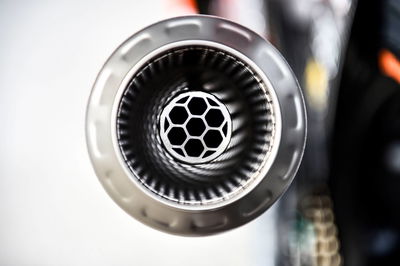
'It's about keeping the sport alive'
Although KTM raised its best dry result to sixth last season, plus a best-yet eleventh overall in the world championship for Pol Espargaro, the factory was again ranked fifth out of the six manufacturers.
Beirer admits it's harder to sign-up for a cost-cutting technical freeze when you are playing catch-up rather than at the front, but said the bigger picture was more important.
"It's anyway crazy if you see the development in the last years, how close everything came and how close you must be to the number one guy to get even one grand prix point," said the German. "The field is incredibly close.
"I think there was a big understanding between all manufacturers that if we keep our development still for some time and pick up racing as we were ready to do for Qatar 2020, everything's good.
"Still there will be a gap between the manufacturers and for us, we still need to pick-up speed and it's not a good moment of course for us to freeze the development from that respect. It's easier to freeze development if you are the leading guy in the class!
"But, like I said, at the moment it's not about who we beat, it's about keeping the sport alive because the industry is under heavy pressure through this crisis."
As such, KTM was also prepared to homologate its 2020 engine in 'Qatar spec', just like non-Concession manufacturers Ducati, Honda, Yamaha and Suzuki.
But with Aprilia debuting a heavily revised engine this year - in the knowledge they could fix any design issues at will under the normal rules - a compromise was reached whereby the two Concession teams can now wait until the end of June before summitting their final 2020 engine design.
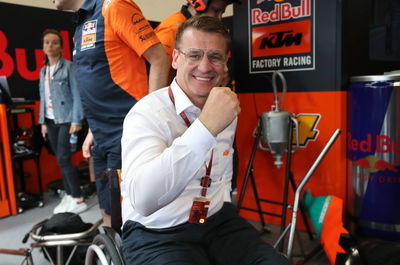
'We battle every week, but we are all in the same boat'
While the exact 2020 MotoGP calendar is not yet known, a restart is planned for Jerez on July 19. It should be the first of around 10-12 races in Europe, including back-to-back events held at the same track.
"I must say any track in the world is much better than sitting at home and watching Covid-19!" joked Beirer, when asked about the likely calendar line-up including Jerez, Red Bull Ring, Brno, Aragon, Catalunya, Misano and Valencia.
"You cannot believe how much we want to race, so we didn't even think about which could be the best tracks for us or other people. Really the whole paddock will be so happy to travel to Jerez and race and then I think all the tracks which are on the calendar are good tracks for us.
"So definitely no excuse from this point of view. It's a good calendar but it's not confirmed, so like I say there is a lot of hope behind that calendar and Dorna is working day and night with all the promoters to make it happen and they have the full support from the industry.
"I also want to underline that we had a great time with the other manufacturers. In a normal season we battle every week on the track, but in this crisis we remembered that we are all in the same boat.
"We had a really good discussion between us - all manufacturers and Dorna - to reduce the number of people in the [closed-door] paddock, to freeze technology on the bikes and to make everything that is needed to fulfil a [safety] protocol that will hopefully allow us to race."
